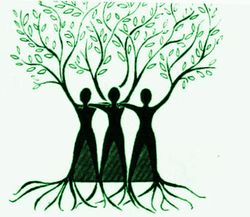Rashid Latif Ansari:
 The very next day that 2013 is ushered in, I would step in to the 83rd year of my life, leaving me little time to do much. However, I resolve to devote my remaining time and energy to strive for the reversal of the centuries old myth of male superiority, which was only due to a single male attribute, the greater muscular power. With the advancements in science and technology, the muscular power has, and will have, to give in to the brain power, in which females are exhibiting greater prowess. Since 80’s women in the Western colleges are out numbering and outperforming men. Women bring and nurture new life, build homes and societies and rarely take part in criminal activities that take away life and destroy properties. They live longer and lead much healthier life than men. Leaving aside muscular power, what else men can boast about for their superiority? Allow me to take couple of minutes of your time to quote the findings of Greg Hampikian, a professor of biology and criminal justice at Boise State University, USA:
The very next day that 2013 is ushered in, I would step in to the 83rd year of my life, leaving me little time to do much. However, I resolve to devote my remaining time and energy to strive for the reversal of the centuries old myth of male superiority, which was only due to a single male attribute, the greater muscular power. With the advancements in science and technology, the muscular power has, and will have, to give in to the brain power, in which females are exhibiting greater prowess. Since 80’s women in the Western colleges are out numbering and outperforming men. Women bring and nurture new life, build homes and societies and rarely take part in criminal activities that take away life and destroy properties. They live longer and lead much healthier life than men. Leaving aside muscular power, what else men can boast about for their superiority? Allow me to take couple of minutes of your time to quote the findings of Greg Hampikian, a professor of biology and criminal justice at Boise State University, USA:
· Much against the myth of male lineage, ‘an uninterrupted, intimate and essential maternal connection defines our species.’
· ‘Women are both necessary and sufficient for reproduction, and men are neither. From the production of the first cell (egg) to the development of the fetus and the birth and breast-feeding of the child, fathers can be absent. They can be at work, at home, in prison or at war, living or dead.’
· ‘Your life as an egg actually starts in your mother’s developing ovary, before she was born; you were wrapped in your mother’s fetal body as it developed within your grandmother.’
· ‘After the two of you left Grandma’s womb, you enjoyed the protection of your mother’s prepubescent ovary. Then, sometime between 12 and 50 years after the two of you left your grandmother, you burst forth and were sucked by her fimbriae into the fallopian tube. You glided along the oviduct, surviving happily on the stored nutrients and genetic messages that Mom packed for you.’
· ‘Then, at some point, your father spent a few minutes close by, but then left. A little while later, you encountered some very odd tiny cells that he had shed. They did not merge with you, or give you any cell membranes or nutrients — just an infinitesimally small packet of DNA, less than one-millionth of your mass.’
· ‘Over the next nine months, you stole minerals from your mother’s bones and oxygen from her blood, and you received all your nutrition, energy and immune protection from her. By the time you were born your mother had contributed six to eight pounds of your weight. Then as a parting gift, she swathed you in billions of bacteria from her birth canal and groin that continue to protect your skin, digestive system and general health. In contrast, your father’s 3.3 picograms of DNA comes out to less than one pound of male contribution since the beginning of Homo sapiens 107 billion babies ago.’
· ‘If a woman wants to have a baby without a man, she just needs to secure sperm (fresh or frozen) from a donor (living or dead). The only technology the self-impregnating woman needs is a straw.’
· ‘Recently, the geneticist J. Craig Venter showed that the entire genetic material of an organism can be synthesized by a machine and then put into what he called an “artificial cell.” Mr. Venter started with a fully functional cell, then swapped out its DNA. In doing so, he unwittingly demonstrated that the female component of sexual reproduction, the egg cell, cannot be manufactured, but the male can.’
· ‘If all the men on earth died tonight, the species could continue on frozen sperm. If the women disappear, it’s extinction.’
Keeping Greg’s beautiful expose’ in mind and recollecting the shameful attacks of terrorists on unarmed civilians, recently targeting even a school going girl, Malala (Pakistan), the wanton killing of school children in Newton USA and the latest barbaric act of gang rape (Delhi, India) culminating in an un imaginable torturous death of an innocent victim, a young woman, I feel that it is high time that the women take the driving seat and transform this world from the mayhem created by men to a peaceful, considerate and compassionate planet.
In 2013, I will contribute my humble bit towards this cause. Will you too???
More here. (Note: Thanks to dear friend Javed Jabbar)
